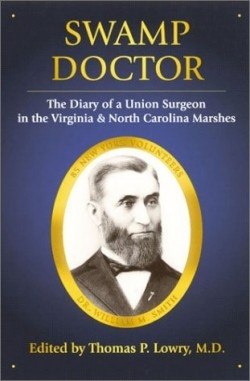Swamp Doctor
The Diary of a Union Surgeon in the Virginia and North Carolina Marshes
To the outsider, war means decisive troop movements, big battles, and death from field injuries. While Surgeon William M. Smith observed all of these, his diary also bears witness to confused troop movement, death by preventable diseases, and plain boredom. The editor, a retired psychiatrist, has written several books about the Civil War, telling aspects of the story that are usually left out of the textbooks. In Swamp Doctor, he avoids the epic and brings to light the everyday experiences and commonplace worries that occupied Smith’s mind while he provided medical service for the Union Army during that war. The doctor misses his loved ones at home, questions the competence of his superiors, and is anxious that his reputation will suffer at the hands of rival officers.
Smith is an untiring worrier, especially concerning his fiancée in New York. He wonders over and over about her faithfulness. Has she been seen in society too often, with the wrong kind of person. He privately chides her for not writing more often, and, when she does write, for not relieving him of all doubts. He writes that her letter “is marked by evidences of an increasing devotion to the pleasures and allurement of social life. It worries me greatly.” That he would later marry Miss Lyon, and stay married to her for the remainder of his life, may lead readers to believe that she was never privy to his journal.
Despite his worries, Smith was a compassionate doctor. In several moving passages, he relates how he aided a prostitute who had become ill with fever. This is incongruous, because other entries speak judgmentally of “fallen women” and of the “weak” officers who visit them. His religion and piousness, however, fall by the wayside when he provides medicine and comfort to the dying woman, and attempts to help her younger sister. “I sent my cook to stay with them and do what she could to give them present relief…”
Perhaps Smith had it easier than many soldiers, but his role as a doctor offers a distinct point of view. His self-portrait also stands in contrast to the belief, prevalent in his time, that many doctors were incompetent and addicted to drink. The editor’s commentary clarifies geography, troop movements, and nineteenth-century medicine. Swamp Doctor offers an opportunity for the contemporary reader to travel back in time and observe life in the Union Army of 1862-1863.
Reviewed by
Ronald D. Lankford, Jr.
Disclosure: This article is not an endorsement, but a review. The publisher of this book provided free copies of the book to have their book reviewed by a professional reviewer. No fee was paid by the publisher for this review. Foreword Reviews only recommends books that we love. Foreword Magazine, Inc. is disclosing this in accordance with the Federal Trade Commission’s 16 CFR, Part 255.

